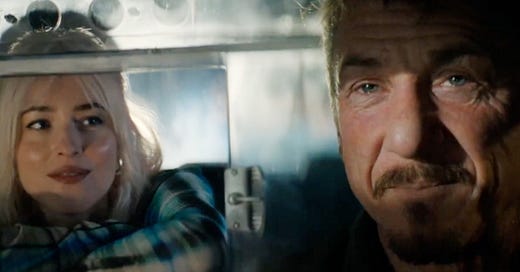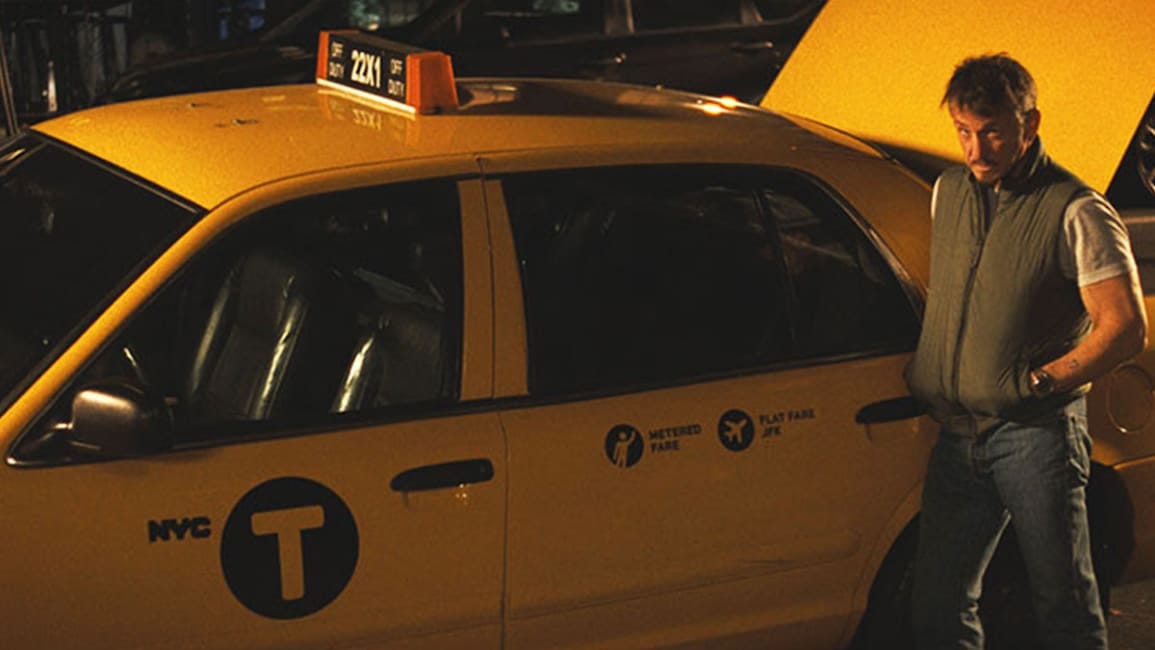Dakota Johnson and Sean Penn share a late-night taxi and some closely held secrets
Daddio (2023)
In theaters
For me, the cab ride from JFK Airport back to my apartment in Manhattan is always a reconnection. It’s the final leg of the journey from wherever I’ve been to re-immersion in my well-worn life.
Of course, as anyone who’s taken that trip knows, you’re not alone. This movie suggests that the driver, whom you usually don’t think about, might be on a journey, too.
Time in his presence may not be just a commercial transaction. Human intersection is possible despite the plexiglass barrier between you.
Clark (Sean Penn) is in his early 60s and has been driving a cab in NYC for 20 years. For his last fare on this particular night, the airport’s taxi dispatcher pairs him with a striking blond woman (Dakota Johnson) who looks to be in her early 30s.
For virtually all the 1 hr. 41 min. runtime they’re the only two people we see, and all the “action” transpires inside Clark’s taxi.
I didn’t want to get out. In her writing and directing debut, Christy Hall has dared to let two people in a tightly confined space touch each other only in the most private place – the mind.
The credits call the woman “Girlie” because she’s reluctant to give her real name, and Clark’s name doesn’t much matter either. Their slyly teased out openness is what we’re going to get a look at.
Hall’s script blots out story and goes straight for truth. The attractive blond is returning from a two-week visit to her half-sister in Oklahoma. At first, she makes it sound as though the getaway has been a warm reunion, but we slowly learn that she and her sister were raised mostly apart, and their connection is tenuous.
Clark offers a guess that she works in a glamorous field like fashion. Actually, she’s a seasoned computer programmer who, she explains, arranges zeroes and ones in intricate patterns. “Zeroes and ones,” Clark asks, “like, yes, and no?” That’s pretty much it, she tells him, off and on, in elaborate configurations.
That plain description gives Clark his opening, and he slowly persuades her to reveal the crucial yeses and noes, offs and ons, in her life.
Dakota Johnson’s is a lonely woman slowly opening up to her sympathetic cab driver
Unbeknownst to him, as they talk, she’s exchanging texts with the married man she’s having an affair with. Their tapped-out words are shown in closeup on the woman’s phone and sometimes writ large on screen.
He’s missed her, the adulterous husband texts. He’s also now physically aroused and sends a graphic photo to prove it. The explicitness doesn’t seem unexpected by the young woman, and her replies suggest they’ve done this before.
But she doesn’t look entirely pleased, and a painful expression crosses her face. Without any idea of what’s happening on her phone, Clark keeps probing, and gradually “Girlie” reveals to him the hard questions she’s struggling with.
Uncannily, he often foretells her problems just before she speaks about them. He’s earned his insights through hard knocks of his own.
Twice divorced, he now lives alone in Queens, wondering why his tried-and-true work ethic doesn’t give him real peace, why talking to strangers in his cab provides most of his honest connections to other people. Driving a cab has its pleasures, but it’s become his whole life, and he doesn’t know how to give it up.
They keep talking, and we can believe they’d let their hair down because, as Clark says at the outset, “You’ll never see me again.” The screenplay of course flips that: What do they have to lose?
Is there a plot? We quickly relinquish the whole notion, since only a ten mile or so cab ride keeps these two together.
We’re parties to not just a conversation but a web of confessions. Neither of these people needs the other. But both need to be heard. Mostly, as it turns out, to be heard by themselves.
The challenge and the subtle pull of Hall’s script is that it isn’t telling a story. There’s hardly a discernible beginning, middle or end. Only piercing moments, swiftly left behind as the cab keeps rolling toward the mysterious island.
There is one “trick” that serves this frankly contrived situation well. Mid-journey, police bring all traffic to a halt while vehicles in a perhaps fatal collision have to be pried apart and hauled away.
This stall along the route allows Clark to turn to his passenger and talk face to face. Until then they’ve been viewing each other through the cab’s rearview mirror, a cinematic artifice which surprisingly exerts its own fascination.
But given the chance to look each other in the eye, these two strangers discover an indecipherable something simmering under their words, without knowing quite what it is. When the accident’s wreckage is removed, and they resume the trip, their inner journey has nowhere to go but deeper.
This peeling away of layers is carried off by Penn and Johnson with astonishing precision. All we have to look at it is two characters, two actors, in a taxi locked in flowing traffic for virtually the entire run time, yet the movie doesn’t lumber along, entrapping us with a gimmick.
Somehow this up and close and personal encounter never feels ginned up or claustrophobic.
One powerful reason is, they use rough, salty language that hits our ears with a sharp street pungency. These are explicit words people actually use, especially when their guard is down. The script never turns cozy or “polite”.
But social accuracy alone wouldn’t be enough to compel us. The two actors rivet us because their lines are cutting, brief, and rhythmically urgent.
They express feelings neither person necessarily wants to utter, but the ravaging words pour out like lava, almost of their own accord. Niceties would signal dodging the truth.
The cab’s plunge into the surrounding night is so smoothly shot and cut, the forward motion itself relays a kind of relentless, unyielding pressure.
Sean Penn is the tough New York City cabbie who’s seen it all ’til one surprising night
Cinematographer Phedon Papamichael and editor Lisa Zeno Churgin make you feel the life of the city swirling around these two people held momentarily in a bubble. They’re two New Yorkers too smart to try playing dumb.
As the taxi moves, we hope to learn all we can about them, before we have to let them go. Cab rides inevitably reach a destination. Does the end of a trip sever a connection, too?
Most impressive is the way Penn and Johnson write emotions across their faces like captured lightning, making them crinkly, worried, attractive and mesmerizing in rapid, terribly tight closeups.
We’re parties to not just a conversation but a web of confessions. Neither of these people needs the other. But both need to be heard. Mostly, as it turns out, to be heard by themselves. That’s of course what the word “insight” suggests. Seeing within. And facing what’s there.
If you watch and listen carefully to this extraordinary, beautifully charted journey to the inner life you just might meet up with your own unspoken dreads and dreams. The word “trip” could take on a whole new dimension.







Very interested in this movie. As a former limo driver, I took that trip many, many times. I used to take the back roads through Queens, and my favorite quotation is what Julie Andrews once said (with a very proper English accent) : "I don't believe I know where we are!"